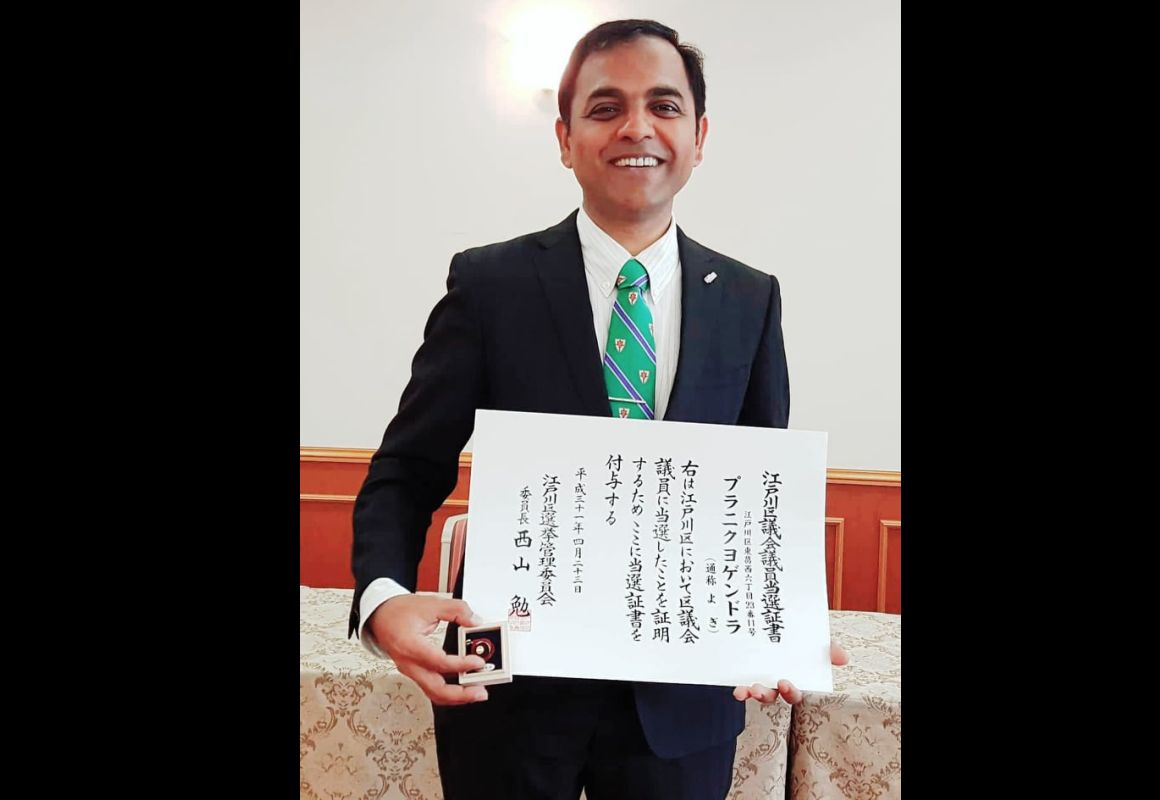Yogi allots portfolios to newly-inducted ministers in UP
According to officials here, SBSP president and cabinet minister Om Prakash Rajbhar has been given the responsibility of Panchayati Raj, Muslim Waqf and Haj and Minority Welfare Department.
In an interview to The Statesman, Yogendra ‘Yogi’ Puranik says he will put in ‘120 per cent’ for the sake of all those who voted for him

Yogendra Puranik has done something unprecedented. The Indian-origin man nicknamed ‘Yogi’ is the first Indian to contest and win a local election in Japan. The 41-year-old Indian-origin Japan national, a banker, won Tokyo’s Edogawa polls and was elected the City Councilor or Legislator to the Edogawa ward. He secured 6,477 votes, the fifth highest of the 226,561 valid ballots cast in the April 21 poll, which was part of the unified local elections held across Japan.
Yogi, who is originally from Pune in Maharashtra, however does not intend to become a full-fledged politician. Rather, he wants to bring bank culture to the assembly working on positive agendas in a planned manner. Most importantly, he is determined to delivering in the coming four years as he believes people are expecting more from him as compared to his fellow legislators. And he says he needs to put in “120 per cent” to convince those who voted for him.
Yogendra Puranik claims he has been registered as “Trend Setter” by Yahoo Japan, which adds another feather to his cap.
Advertisement
In an interaction with The Statesman over email, Puranik says getting registered as one of the trend setters by Yahoo Japan is an honour. Excerpts from an interview:
When did you first go to Japan?
It was in 1997 and 1999 that I came here (to Japan) as a student. Since 2001, I have been here on work permit. I am working with Rakuten Bank as Vice-Director of Corporate Planning Division.
What inspired you to enter politics?
I have served as volunteer for Japanese and Indian community for years. However, after feeling limitations with it, I thought of entering legislation.
You secured 6,477 votes, the fifth highest of the 226,561 valid ballots. What do you think has been the reason for this win?
I think people want a change. While many other candidates also had similar points in their mandate, I gave very logical and strong convincing speeches to turn votes to my favour. I have covered all age groups in my mandate and have mentioned to tackle their needs in an integrated manner which no other candidate mentioned.
Backed by the Constitutional Democratic Party of Japan, what do you intend to do for that country, and also India?
Constitutional Democratic Party is in the opposition right now. However, I would like to work on betterment agendas with young legislators irrespective of party politics. Good things should not stop. Playing a role for two countries should be beyond the boundaries of political parties.
Edogawa Ward has the highest number of Indian residents among Tokyo’s 23 wards, with 4,300 or so Indian nationals registered, accounting for more than 10 per cent of Indians living in Japan. Over 34,000 Indians live in Japan. The Edogawa Ward also has a large number of Chinese and Koreans. Do you think you got the blessings of the Chinese and Koreans too?
While very few Indians in Edogawa are naturalised citizens, I think I got many votes from the Chinese and Korean communities. I have good relations with these communities. Many of them walked up to me to shake hands during the campaign.
What do you have to say about Japan and its people?
Japan is simple, clean, safe and peaceful. However, I am seeing a lot of social and structural changes as the number of foreigners is also rapidly increasing. Japan cannot falter at this stage especially with the policies towards immigrants. Japan will need some leaders like me to bridge the gap between Japanese and non-Japanese communities, and also to help Japan walk into the next stage.
When did you plan to acquire the nationality of Japan?
In 2011, after the big earthquake and tsunami in Japan, there was a lot of turbulence. I assume more than 50 per cent of Indians left for India. That time, I did not feel like leaving Japan. Rather, I actively involved myself in volunteering in Tokyo and other affected areas. Then I got a feeling that it’s time to consider a long term life in Japan. As IT employees, we all are living here with a lot of uncertainty. I realised that I am not having a good quality life under that uncertainty. By July 2011, I took the first interview with the home ministry and I was a naturalised citizen of Japan by 2012.
What is your take on Indo-Japan relations?
Indo-Japan relations have continued over approx 14 to 15 centuries. India shared its religion, culture and language with Japan. And now Japan is sharing funds and technology. Now, both countries are sharing good relationships which can be further strengthened in various areas. At the same time, India should be careful about not increasing its debt beyond manageable limits.
How does it feel to be the first Indian to win the elections? Please tell something about your upcoming plans as a politician?
I do not intend to be a pure politician. I have been a banker for several years and I want to bring that culture to the assembly, working on positive agendas in a planned manner. Most importantly, I must deliver in the next four years as people are expecting more from me as compared to my fellow legislators. And I must deliver at least 120% to convince those who voted for me.
Advertisement